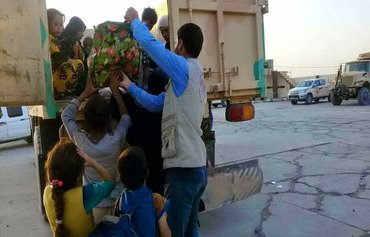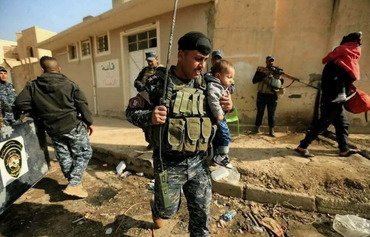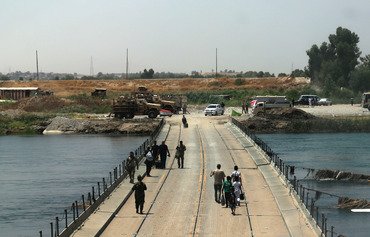The Iraqi government has initiated proceedings to hand over family members of foreign "Islamic State of Iraq and Syria" (ISIS) fighters to their home countries, the Ninawa provincial council announced Wednesday (November 22nd).
During the battles to liberate western Mosul and the district of Tal Afar, Iraqi forces evacuated hundreds of foreign women and their children, after their husbands were killed in the fighting.
"A total of 1,451 foreign women and children were evacuated, most of whom were from Turkey, Chechnya and Uzbekistan," said Ninawa provincial council services committee member Hosam Eddin al-Abbar.
"They were first taken to safe camps in al-Qayyarah and Hammam al-Alil south of Mosul," he told Diyaruna, adding that they were later moved to a heavily fortified shelter in Tall Kayf, north of Mosul.
The Iraqi government now intends to move them to Baghdad ahead of deporting them to their home countries in batches, he said.
"The government has started contacting the governments of the countries from which these individuals have come in order to hand them over to them," he said.
Those families pose a heavy burden on the Iraqi government, he said.
For months, they have been subjected to a rigorous security check to verify that they had not participated in the fighting with ISIS or provided any kind of assistance and support to the group.
Al-Abbar said Iraqi authorities also are holding female Iraqi nationals who were married to ISIS fighters and who were evacuated with their children from Mosul and Tal Afar.
"There are about 450 such women and children," he said, adding that they are receiving care from the government.

![Iraqi policemen help families who were stuck in the midst of the battles to liberate Mosul from the 'Islamic State of Iraq and Syria'. [Photo from the Iraqi Federal Police Command Facebook page]](/cnmi_di/images/2017/11/22/10468-Iraq-Mosul-families-600_384.jpg)






